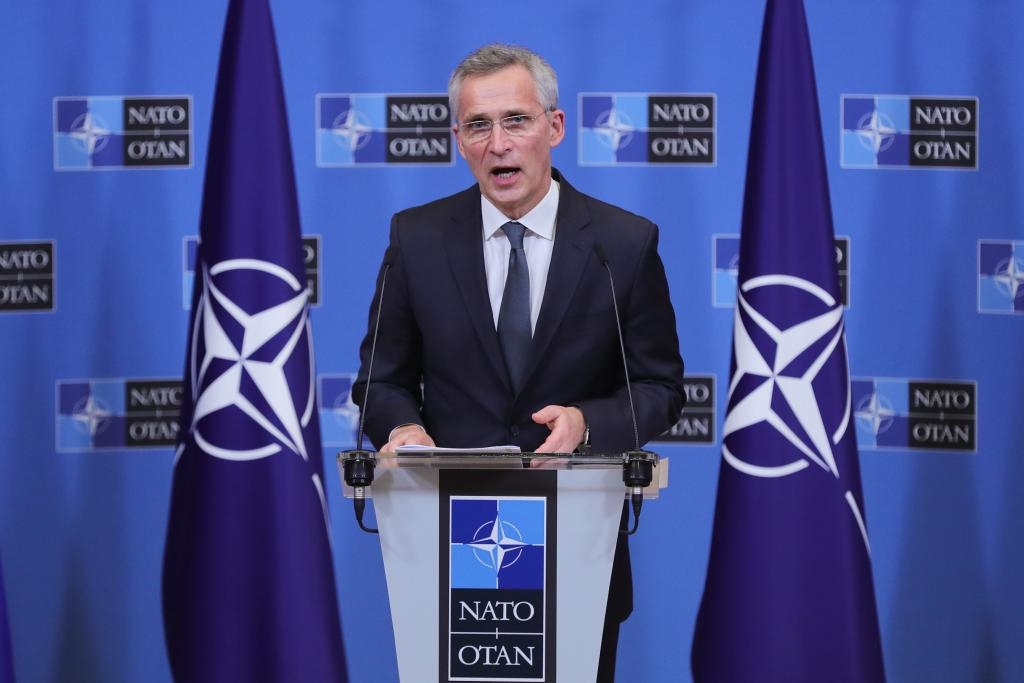Stoltenberg’s comments came amidst growing pleas for shells, ammunition and other military aide from Ukraine as it battles Russian forces into a third year…reports Asian Lite News
NATO’s secretary general called on Europe to increase its arms production to support Ukraine and prevent “potentially decades of confrontation” with Moscow, in an interview published by German media Saturday.
Ahead of a key meeting of NATO defense ministers in Brussels and the second anniversary of the Russia-Ukraine war, Jens Stoltenberg insisted that “we need to reconstitute and expand our industrial base faster, to increase deliveries to Ukraine and refill our own stocks.”
“This means shifting from slow peacetime to high-tempo conflict production,” he told the German Sunday daily Welt am Sonntag.
Stoltenberg’s comments came amidst growing pleas for shells, ammunition and other military aide from Ukraine as it battles Russian forces into a third year.
Western leaders have also called for greater assistance. Germany’s Chancellor Olaf Scholz and President Joe Biden urged US lawmakers Friday to approve a long-delayed military aid package for Ukraine, warning that Kyiv could not hold off Russia’s invasion without it.
“The failure of the United States’ Congress in not supporting Ukraine is close to criminal neglect,” Biden said as he hosted Scholz in the Oval Office on Friday.
Stoltenberg said: “There is no imminent military threat against any ally. At the same time, we hear regular threats from the Kremlin against NATO countries.”
Russia’s invasion of Ukraine nearly two years has shown that “peace in Europe cannot be taken for granted,” the NATO chief said, emphasising the importance of protecting countries in the alliance.
“As long as we invest in our security and we stay united, we will continue to deter any aggression,” he said.
“NATO does not seek war with Russia, but we need to brace ourselves for potentially decades of confrontation,” he added.
“We monitor closely what Russia does and we have increased our presence in the eastern part of the alliance,” Stoltenberg said.
“If Putin wins in Ukraine, there is no guarantee that Russian aggression will not spread further. So supporting Ukraine now and investing in NATO’s own capabilities is our best defense.”
NATO defense ministers will meet in Brussels on February 15, one week ahead of the second anniversary of Russia’s offensive in Ukraine. A meeting of the Ukraine Defense Contact Group will be a key feature of the talks.
NATO-Ukraine Council to meet on Feb 15
A meeting of the NATO-Ukraine Council at defence minister level will be held on 15 February. The meeting will take place as part of a two-day meeting of NATO defence ministers to be held in Brussels on 14-15 February.
The NATO-Ukraine Council was launched at the Vilnius Summit in July 2023 as a new format for the relationship between the North Atlantic Alliance and Kyiv. The Council’s first meeting took place on 12 July.
NATO has scheduled the 19th meeting of the Ukraine Defence Contact Group, known as the Ramstein format, for 14 February, the day before the Council meeting.
The Contact Group’s previous meeting, which focused on Kyiv’s long-term needs, was held online.
The Brussels meetings will take place at a time when Ukraine is in desperate need of artillery shells and the Ukraine funding bill has stalled in the US Congress.
‘Plan for the unexpected’
Ukraine is locked in an existential battle for its survival almost two years into its war with Russia and Western armies and political leaders must drastically change the way they help it fend off invading forces, a top NATO military officer said on Wednesday.
At a meeting of the 31-nation alliance’s top brass, the chair of the NATO Military Committee, Admiral Rob Bauer, also said that behind President Vladimir Putin’s rationale for the war is a fear of democracy, in a year marked by elections around the world.
Over two days of talks in Brussels, NATO’s top officers are expected to detail plans for what are set to be the biggest military exercises in Europe since the Cold War later this year. The wargames are meant as a fresh show of strength from NATO and its commitment to defend all allied nations from attack.
As the war bogs down, and with U.S. and European Union funding for Ukraine’s conflict-ravaged economy held up by political infighting, Bauer appealed for a “whole of society approach” to the challenge that goes beyond military planning.
“We need public and private actors to change their mindset for an era in which everything was plannable, foreseeable, controllable and focused on efficiency to an era in which anything can happen at any time. An era in which we need to expect the unexpected,” he said as he opened the meeting.
“In order to be fully effective, also in the future, we need a warfighting transformation of NATO,” Bauer added.
On Monday, U.K. Defense Secretary Grant Shapps announced that his government would send 20,000 troops to take part in the NATO military exercises — known as “Steadfast Defender” — with many deployed in eastern Europe from February to June.

Leave a Reply